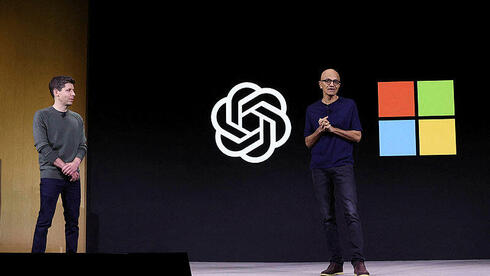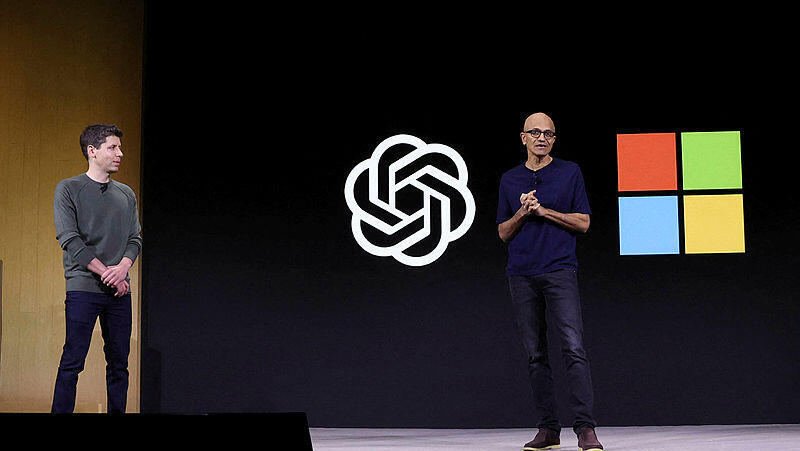
Analysis
Microsoft and OpenAI: Navigating a complex partnership post-shakeup
At this stage it is not yet clear what exactly the effect of the removal of the outgoing CEO Sam Altman from OpenAI will be on the company, but one thing is certain - this move was particularly beneficial to the investor Microsoft, which announced ahead of time that it would hire Altman and the members of the OpenAI management who left after his firing
It is not yet clear who will lose from the conflict over control of OpenAI, which began with the ouster of founder and CEO Sam Altman, continued with the attempt of the company's leading investors to reverse the board's decision, and ended with the directors dismissive behavior towards the investors, appointing a new CEO while Altman and his loyalists joined Microsoft. It is, however, almost certainly possible to mark a winner at this stage: Microsoft, which managed to maneuver itself into a position where no matter what happens in the end, it will probably reap the fruits of victory.
Late Sunday night, Microsoft CEO Satya Nadella announced that Altman will join Microsoft, where he will head a "new advanced AI research team." Altman will be joined by former OpenAI president Greg Brockman, who resigned following Altman's ouster, and a number of other executives and employees who also resigned in protest over the removal of Altman. "We look forward to moving quickly to provide them with the resources needed for their success," Nadella wrote in a post he published on X (formerly Twitter). Altman responded briefly: "The mission continues."
1 View gallery


Sam Altman (left) and Microsoft CEO Satya Nadella
(Photo: Justin Sullivan / Getty Images North America / AFP)
It was the end of a short, but emotional and well-publicized control struggle, which began on Friday when OpenAI's board of directors removed Altman from the position of CEO, amid what was described as the "breakdown of communication" between the parties. The removal was carried out in a hasty procedure and without the knowledge of the company's major investors, led by Microsoft which invested about $13 billion in OpenAI. Microsoft and other investors began working to reverse the board's decision, and tentative agreements were already forming for Altman's return. However, on Sunday night, the board completed the coup and appointed the former CEO of Twitch, Emmett Shear, as CEO.
Microsoft and Nadella were quick to take advantage of the opportunity created, and agreed with Altman, Brookman and other OpenAI veterans to join the company. It can be estimated that a group that Altman will lead will consist mainly of OpenAI workers alongside prominent AI experts at Microsoft, and will function as a sort of internal startup, with a generous budget, broad access to the considerable resources of the technology giant and significant freedom for Altman. "We’ve learned a lot over the years about how to give founders and innovators space to build independent identities and cultures within Microsoft, including GitHub, Mojang Studios, and LinkedIn, and I’m looking forward to having you do the same,” wrote Nadella.
At the same time, Microsoft is expected to continue the cooperation with OpenAI. "We remain committed to our partnership with OpenAI," Nadella clarified, "and have confidence in our product roadmap, our ability to continue to innovate with everything we announced at Microsoft Ignite, and in continuing to support our customers and partners. We look forward to getting to know Emmett Shear and OAI's new leadership team and working with them."
There are many possible scenarios as to what will happen going forward. Microsoft has promised that in almost every one of them, it will come out on top. One possibility is that OpenAI will be able to recover quickly from Altman's ouster and the exodus it sparked, and continue to charge forward with minimal upheaval. It still has all the technology, algorithms, and intellectual property that made its generative AI products so sought-after, and it will have no trouble hiring AI experts to replace those who have quit. In such a case, Microsoft could continue to leverage its existing collaboration with the company.
Another possibility is that OpenAI will not overcome the shock so easily, will collapse or, in a more likely scenario, will struggle to keep innovating at the same rate and lose its market relevance within a few quarters. Such a case would indeed represent a financial, business and image loss for Microsoft, but it would still have another path to success: Altman's new group.
Microsoft has proven over the past few years that it is able to absorb companies or products and allow them wide enough autonomy to preserve their corporate culture, while giving them access to resources that help propel them forward. GitHub, Mojang Studios (developer of Minecraft) and LinkedIn are the most prominent examples. With Altman the challenge is more complex, as it will be necessary to build a new business activity from the ground up, a sort of start-up within a larger corporation.
Altman's experience and the fact that he comes with a cohesive and loyal team help him significantly in this process, and the employees who will join from Microsoft itself are also expected to share the goal and it is also likely that they will already know Altman's team from working together in the past. The main role of Microsoft itself should be to give money, access to the appropriate resources and above all not to interfere too much.
The knowledge and talent that Altman and his loyalists will bring, along with the access to developments and the significant intellectual property that Microsoft already has in the field of generative artificial intelligence, can allow the new group to quickly close gaps with other players and place its activities at the forefront of the field within a few months or quarters. In such a case, Microsoft will find itself in an improved position, even in the event of OpenAI's collapse, since instead of cooperating with the leading player in the field, it itself will own the AI models and the services based on them.
In the most optimistic scenario, both bets succeed, and Microsoft comes away with a profit here and there. And what happens in the event that OpenAI collapses and Altman fails to generate significant activity at Microsoft? In such a scenario, Microsoft would be in trouble, but we the users would be in bigger trouble. Because then Google, and to a certain extent also Meta, will gain a significant advantage and will be able to gain power and control in a market that other companies will have difficulty dealing with. And this scenario is something users have been afflicted by across different markets for the past decade and a half.













